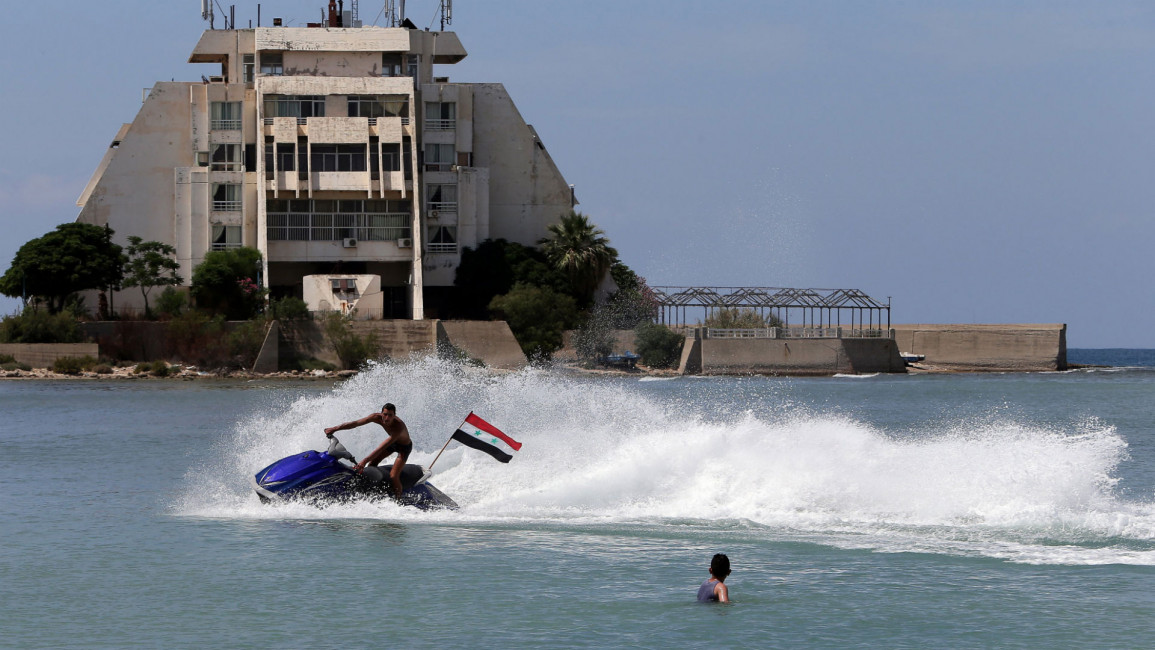
Syria's pampered coast
Syria's pampered coast
Compared with other parts of Syria the coast has been spared much of the fighting. But conditions are still tough and, faced with a bleak future, many have lost hope.
4 min read
A man on a jet ski off Latakia’s shore on Syria’s ‘pampered’ coast (AFP)
They say the Syrian coast, specifically the governorates of Latakia and Tartus, is Syria's "pampered" region.
Barrel bombs have not rained down on them destroying houses and infrastructure, causing those left alive to flee en masse. There are now over two million people from Aleppo, Idlib and other areas in Latakia who have fled their hellish areas. Tartus has taken in another two million refugees mostly from Homs and al-Qusayr.
Barrel bombs have not rained down on them destroying houses and infrastructure, causing those left alive to flee en masse. There are now over two million people from Aleppo, Idlib and other areas in Latakia who have fled their hellish areas. Tartus has taken in another two million refugees mostly from Homs and al-Qusayr.
A quick glance at the streets of Latakia, the city I live in and which I have not left, reveals piles of rubbish, however. We can see women and children rummaging through them
| Syria is a place where all of the world's devils have taken up residence. |
Hundreds of barefoot, dirty children wearing ragged clothes fill the streets to beg for money from passersby. Sometimes those children recline in a coma-like slumber on pavements; sometimes in building entrances; sometimes in parks.
Our eyes have become accustomed to all forms of violations against the innocence of childhood.
Where's the power?
A quick glance at Facebook pages and social media sites is enough for us to read thousands of questions and inquiries asking why electricity and water rationing has increased.
One person writes in dismay: "Just tell us why we are suffering from insulting and illogical electricity cuts. Latakia now enjoys the gift of electricity for only four hours a day."
Another status update reads: "It is now autumn, which means no one is using their air conditioner or heating, so why is electricity being rationed? How can our children study in the dark using the faint light from candles?"
This is the pampered coast, but water rationing now competes with electricity rationing. This means homemakers no longer turn on the washing machine or put food in the fridge, which has turned into a closet, while the washing machine has become decoration.
Housewives instead wash laundry in large washbowls, which makes one feel like a star in Bab al-Hara, the popular Syrian period drama set in a traditional Damascene neighbourhood in the 1930s.
As for the increasingly exorbitant prices that are not proportionate with measly salaries - they are enough to cause Syrian citizens a heart attack or stroke.
Syrians have become used to asking questions without finding the answers. Their only recourse is to scream and protest on Facebook pages, in their search for answers that justify the high prices and the lack of availability of many goods and medicines.
Escape at all costs
 |
|
| Latakia hosts over two million refugees including this girl (AFP) |
A dangerous phenomenon that needs more attention is the spread of diseases caused by a lack of hygiene. They include head lice, mange and leishmania, which disfigures children's faces. Many vaccinations are not available or stocks are short.
As for Syrians' mental wellbeing, everyone lives in despair, also on the Syrian coast. However, no one talks about it because it is considered frivolous to talk about your mental state when you are hungry and daily dealing with death. Every Syrian family has lost a son, a father, or a brother. In the face of a complete social breakdown, speaking of psychological breakdown is more like a joke.
But this acute depression affecting all segments of society is highly visible. According to social psychology, cases of collective depression and even collective suicides can happen when no hope for the future is in sight. Many political analysts say that the hard times have not even started in Syria: all of this death and the displacement of two thirds of the population are merely the start of the disaster awaiting the country.
Who cares about Syria losing its youth? Who cares about the Mersin ferry that left the port of Latakia for the Turkish city of Mersin with 400 Syrian youths aboard? Hopelessness and despair has seeped into the hearts of these youths, pushing them to immigrate to any country they can, risking their lives on boats of death. According to one statistic, more than 3,500 Syrians have drowned trying to escape this terrible country called Syria. A country where all of the world's devils have taken up residence, and which has become the setting for settling scores between every country in the world.
Parasites such as lice, mange and leishmania are being pampered on the Syrian coast, where they are welcomed and live happily. Darkness, hunger and drought are being pampered as thousands rummage through refuse to find something to eat. The Syrian coast is being pampered, chocked by an outrageous density of people.
If this is what being pampered looks like, I can only wonder what the various forms of hell look like in the conflict-ridden parts of the country.
This article is an edited translation from our Arabic edition.
Opinions expressed in this article remain those of the author, and do not necessarily reflect the opinions of al-Araby al-Jadeed, its editorial board or staff.



